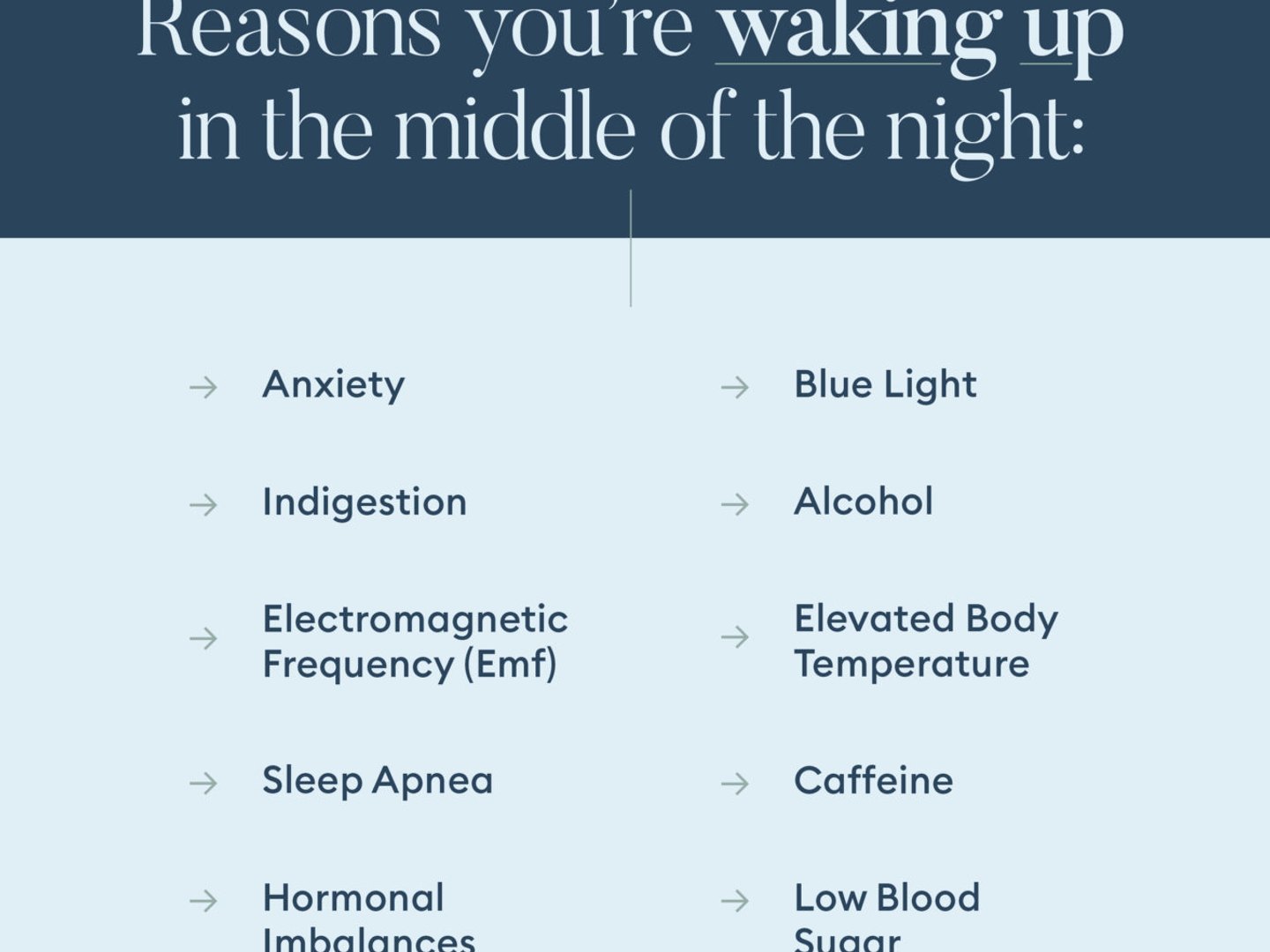Feeling stressed out lately? Well, you’re not alone. Stress has become a common part of our modern lives, affecting us in various ways. One particular way that stress can wreak havoc on our daily routine is by causing frequent awakenings during the night. Yes, you heard it right! Can stress lead to frequent awakenings during the night? Let’s delve into this topic and uncover the connection between stress and those sleepless nights.
When stress levels rise, it’s like an unwanted guest that barges into our peaceful slumber. It’s as if our minds are playing a never-ending game of ping-pong, bouncing from one worry to another, making it nearly impossible to achieve a restful night’s sleep. The relentless thoughts and anxieties that accompany stress can jolt us awake, leaving us staring at the ceiling in frustration. It’s like being trapped in a never-ending cycle of exhaustion and restlessness that can leave us feeling drained and irritable the next day. But how exactly does stress manage to infiltrate our dreamscape? Is there a scientific explanation behind it? In this article, we will explore the fascinating relationship between stress and frequent awakenings during the night, and discover some strategies to help you reclaim your precious sleep. So, grab your favorite blanket, get cozy, and let’s embark on this sleep-filled adventure!
Can Stress Lead to Frequent Awakenings During the Night?
Stress is a common factor that affects many aspects of our lives, including our sleep patterns. It is not uncommon to experience frequent awakenings during the night when stress levels are high. The relationship between stress and disrupted sleep can create a vicious cycle, as poor sleep can also contribute to increased stress levels. In this article, we will explore the connection between stress and frequent awakenings, as well as provide tips on how to improve sleep quality in times of stress.
The Impact of Stress on Sleep
Stress activates the body’s natural fight-or-flight response, triggering the release of stress hormones such as cortisol. These hormones can interfere with the normal sleep cycle, making it difficult to fall asleep and stay asleep throughout the night. Stress can cause racing thoughts, anxiety, and an overall sense of restlessness, all of which can lead to frequent awakenings.
Additionally, stress can manifest in physical symptoms such as muscle tension and increased heart rate, which further disrupt sleep. The combination of mental and physical stress can create a challenging environment for achieving restful sleep, resulting in a cycle of waking up multiple times during the night.
The Connection Between Stress and Sleep Quality
Stress and sleep quality are closely intertwined. When stress levels are high, it becomes harder to relax and unwind before bedtime. This can lead to difficulty falling asleep initially. As the night progresses, the impact of stress continues to disrupt sleep, causing awakenings throughout the night.
Frequent awakenings can have a significant impact on sleep quality. Waking up multiple times during the night interrupts the natural sleep cycle, preventing the body and mind from experiencing deep, restorative sleep. As a result, individuals may wake up feeling fatigued, groggy, and less able to cope with the stressors of the day ahead.
The Role of Stress Management Techniques
Managing stress is crucial for improving sleep quality and reducing frequent awakenings. Incorporating stress management techniques into your daily routine can help calm the mind and promote relaxation before bedtime.
One effective technique is practicing mindfulness meditation. This involves focusing on the present moment and letting go of racing thoughts and worries. By redirecting attention to the breath or a specific point of focus, mindfulness meditation can help alleviate stress and promote a sense of calm conducive to better sleep.
Engaging in regular physical exercise is another powerful stress management tool. Exercise releases endorphins, which are natural mood boosters and stress reducers. By incorporating exercise into your daily routine, you can help regulate stress levels and promote more restful sleep.
The Importance of a Relaxing Bedtime Routine
Establishing a relaxing bedtime routine can signal to the body and mind that it is time to unwind and prepare for sleep. This routine should include activities that promote relaxation and reduce stress, such as taking a warm bath, reading a book, or listening to calming music.
Avoiding screens, such as smartphones and laptops, before bed is also crucial. The blue light emitted by these devices can interfere with the production of melatonin, a hormone that regulates sleep. Instead, opt for activities that promote relaxation and create a peaceful environment conducive to sleep.
Incorporating stress management techniques and establishing a relaxing bedtime routine can help reduce stress levels and improve sleep quality. By addressing the underlying causes of frequent awakenings, individuals can experience more restful and rejuvenating sleep.
Conclusion
In conclusion, stress can indeed lead to frequent awakenings during the night. The relationship between stress and disrupted sleep is complex, with stress causing both mental and physical symptoms that interfere with the sleep cycle. However, by implementing stress management techniques and establishing a relaxing bedtime routine, individuals can mitigate the impact of stress on sleep quality. Prioritizing self-care and finding healthy ways to manage stress can ultimately lead to better sleep and overall well-being.
Key Takeaways: Can stress lead to frequent awakenings during the night?
- Stress can disrupt normal sleep patterns and lead to frequent awakenings during the night.
- When we’re stressed, our bodies produce more cortisol, a stress hormone that can interfere with sleep.
- Anxiety and racing thoughts caused by stress can make it difficult to fall asleep and stay asleep throughout the night.
- Stress-related awakenings can result in poor sleep quality and leave you feeling tired and irritable the next day.
- Managing stress through relaxation techniques, exercise, and healthy lifestyle habits can help improve sleep and reduce awakenings.
Frequently Asked Questions
What are the possible causes of frequent awakenings during the night?
There are several possible causes for frequent awakenings during the night, and stress is one of them. When we experience stress, our body’s natural response is to release stress hormones like cortisol, which can interfere with our sleep patterns. Stress can also lead to racing thoughts and an overactive mind, making it difficult to relax and fall back asleep after waking up during the night.
In addition to stress, other factors that can contribute to frequent awakenings include poor sleep hygiene, such as irregular sleep schedule or excessive caffeine intake, underlying medical conditions like sleep apnea or insomnia, and lifestyle factors like excessive alcohol consumption or certain medications. It’s important to identify the root cause of your frequent awakenings to effectively address the issue.
How does stress affect sleep?
Stress can have a significant impact on our sleep quality and duration. When we are stressed, our body’s stress response system is activated, leading to increased levels of stress hormones like cortisol. These hormones can disrupt the natural sleep-wake cycle and make it difficult to fall asleep or stay asleep throughout the night.
Stress can also lead to racing thoughts and a heightened state of alertness, making it challenging to relax and unwind before bedtime. This can result in difficulty falling asleep or frequent awakenings during the night. Additionally, stress can contribute to the development or worsening of sleep disorders like insomnia, further impacting sleep quality.
How can I manage stress to improve my sleep?
Managing stress is crucial for improving sleep quality and reducing frequent awakenings during the night. Here are some strategies that can help:
1. Practice relaxation techniques: Engage in activities like deep breathing exercises, meditation, or yoga to promote relaxation and reduce stress levels before bedtime.
2. Establish a bedtime routine: Create a consistent routine that incorporates relaxing activities, such as reading a book or taking a warm bath, to signal to your body that it’s time to unwind and prepare for sleep.
3. Prioritize self-care: Take care of your physical and mental well-being by engaging in activities that bring you joy and help you relax. This can include hobbies, spending time with loved ones, or engaging in regular exercise.
4. Create a sleep-friendly environment: Make sure your bedroom is dark, quiet, and cool to promote optimal sleep conditions. Use blackout curtains, earplugs, or white noise machines if necessary.
5. Seek support: If stress is significantly impacting your sleep and overall well-being, consider reaching out to a healthcare professional or therapist who can provide guidance and support in managing stress effectively.
Are there any natural remedies that can help reduce stress-related awakenings?
While there are no magic remedies for stress-related awakenings, certain natural remedies and lifestyle changes may help promote relaxation and improve sleep quality. These include:
1. Herbal supplements: Certain herbs like chamomile, lavender, and valerian root have calming properties and may aid in reducing stress and promoting better sleep. Consult with a healthcare professional before taking any supplements.
2. Aromatherapy: Essential oils like lavender, bergamot, or chamomile can be used in a diffuser or applied topically to promote relaxation and create a soothing sleep environment.
3. Regular exercise: Engaging in regular physical activity can help reduce stress levels and promote better sleep. Aim for at least 30 minutes of moderate-intensity exercise most days of the week.
4. Mindfulness practices: Practices like mindfulness meditation or journaling can help calm the mind and reduce stress levels, making it easier to fall asleep and stay asleep.
When should I seek medical help for frequent awakenings due to stress?
If your frequent awakenings due to stress are significantly impacting your daily functioning, it may be beneficial to seek medical help. Consider consulting with a healthcare professional if:
– Your sleep disturbances persist for an extended period of time and do not improve with self-help strategies.
– You experience excessive daytime sleepiness or fatigue despite adequate time spent in bed.
– Your stress levels are consistently high and affecting multiple areas of your life.
A healthcare professional can help assess your specific situation, identify any underlying issues, and provide appropriate treatment options to address both the stress and sleep disturbances.
Final Summary: Can Stress Lead to Frequent Awakenings During the Night?
Sleep disturbances can be incredibly frustrating, especially when you’re constantly waking up throughout the night. If you find yourself experiencing frequent awakenings, stress may very well be the culprit. Stress has a profound impact on our sleep patterns, disrupting the natural rhythm and leaving us feeling restless and fatigued.
When we’re stressed, our minds tend to race with worries and anxieties, making it difficult to relax and fall into a deep sleep. This can result in multiple awakenings during the night, leaving us feeling tired and groggy the next day. The cycle continues as stress and sleep disturbances feed into each other, creating a vicious cycle that can be challenging to break.
So, how can we address this issue? It’s important to find healthy ways to manage stress and promote better sleep. Engaging in relaxation techniques such as deep breathing exercises, meditation, or yoga can help calm the mind and prepare the body for a restful sleep. Creating a soothing bedtime routine and establishing a consistent sleep schedule can also contribute to better sleep quality. Additionally, seeking support from a therapist or counselor can be beneficial in learning effective stress management strategies. By taking proactive steps to reduce stress and prioritize sleep, you can break free from the cycle of frequent awakenings and wake up feeling refreshed and rejuvenated.
Remember, your mental and physical health are interconnected, and getting enough quality sleep is crucial for overall well-being. Don’t let stress rob you of a good night’s rest. Take control, prioritize self-care, and embrace the peaceful slumber you deserve. Sleep tight!




